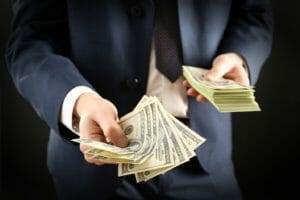It is impossible to reflect on the recent recession without thinking of the unearthing of multimillion- and billion-dollar fraud schemes. We shake our heads and ask how it happened. Was it poor investor due diligence, a lack of government oversight, unchecked lending or just greed? But when it comes to fraud, watch out, because emerging from this recession may just be, in the words of baseball legend Yogi Berra, “Déjà vu, all over again.”
Business fraud
Forensic accountants have long known that business fraud is heavily dependent on an individual’s position in an organization and the level of tempting circumstances. Occupational fraud is commonly defined by the Association of Certified Fraud Examiners as “the use of one’s occupation for personal enrichment through the deliberate misuse or misapplication of the employing organization’s resources or assets.” We all recognize these bad acts as corruption, asset theft and financial statement fraud. The general rule for occupational fraud is the higher the rank in the organization, the greater the risk for a significant fraud to be committed.
The circumstances that create fraud temptation fall into three categories that create what is called the Fraud Triangle. This is a well-known fraud model based on the work of criminologist Donald R. Cressey, and is aimed at understanding why people commit occupational fraud. The Fraud Triangle reflects the three elements that must be present for fraud to be committed:
- Incentive or pressure
- Opportunity
- Rationalization
Incentive or pressure is the presence of non-sharable personal problems, which often include a belief that money will make a problem go away. For example, an unpaid mortgage or the threat of the loss of employment can cause stress and, therefore, increase the pressure for an employee to steal an employer’s cash or fudge an expense account.
The element of opportunity requires a perception that one has the position, knowledge, skill and access needed to commit fraud unnoticed and undetected by others.
Rationalization is a person’s ability to plan, commit and hide fraud in the workplace with a belief that the bad act is reasonable and justified.
Business fraud bubble
In the first decade of this century, as the stock market continued to experience significant growth, the real estate market boomed. As employee compensation mimicked these gains, the propensity for occupational fraud skyrocketed. It was a time in which hard money loan returns were uncharacteristically high, double-digit real estate investment gains were an expectation, consumer confidence was strong, and new investment strategies abounded. Simultaneously, the rapidly growing economy and limited regulatory oversight over complex investment vehicles sparked increasing fraudulent behaviors ranging from mortgage fraud to Ponzi schemes.
In terms of the Fraud Triangle, all the elements for a fraud disaster bubble were present. Incentives for massive wealth creation were unprecedented. Investors blinded by greed created an easy opportunity for criminals. And the rationalization cry of “everyone’s doing it” was heard at every office water cooler. All the signs were there that the big burst was about to happen.
Recession fraud trouble
While much of the fraudulent behavior went undetected for years, the recent economic downturn led to increased scrutiny and fraud detection. Be warned, however, that recovery from the recession has created a whole set of new business fraud risks.
Today, we are faced with weak consumer confidence, increasing business failures, record levels of unemployment, depressed real estate markets, restricted access to loans and capital, impaired retirement accounts, and a likely future of increasing taxes and governmental debt. In the world of the forensic accountant, this is an enormous amount of pressure that is increasing the risk of fraud. That pressure, when combined with shrinking business oversight due to layoffs and cost cutting, and desperation felt by the average worker to get all he can before he is fired, add opportunity and rationalization to complete the Fraud Triangle in ways never experienced before.
Forensic accounting against fraud
More and more businesses are discovering that forensic accounting is an effective tool in the management and defense of fraud. The American Institute of Certified Public Accountants defines forensic accounting services as “the application of specialized knowledge and investigative skills possessed by CPAs to collect, analyze and evaluate evidential matter and to interpret and communicate findings in the courtroom, boardroom or other administrative venue.”
Hot services right now include:
- Fraud assessment, monitoring and compliance: Sometimes referred to as fraud “audits” (although they are not per se), these services include fraud-risk assessment, implementation of fraud detection and prevention programs and fraud monitoring activities.
- Forensic due diligence: These services are designed to discover information and confirm facts using data analytics, investigative techniques, background checks and other methods.
- Fraud investigation: This type of forensic service responds to allegations of fraud, white-collar crime, waste and abuse.
- Fraudulent conveyance and preference search: Typically performed in connection with bankruptcy proceedings, this forensic service includes the search for and analysis of potentially fraudulent transfers and preferential payments.
- Asset tracing and recovery: Forensics services in this area identify hidden assets and include efforts to locate and recover them.
- Anti-money laundering and foreign corrupt practices act: Compliance with federal and state laws is an important activity, and these services assist to identify compliance risks and to assess and test existing systems, practices and procedures.
- Litigation consulting: These are forensic accounting services performed in connection with litigation. Forensic accountants often serve as expert witnesses related to fraud and damages.
As much as we would like to put the fraud of the last decade behind us, exiting the current recession is looking to be a risky proposition. The pressure, opportunity and justification to commit fraud may be at unprecedented levels. A healthy awareness about this risk, together with knowledge of forensic accounting services to control the risk, will be important.
Fraud Triangle
Incentive or Pressure




